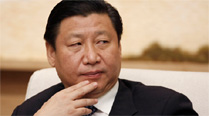This article is guilty of spreading panic and disorder
More general signs of a crackdown on expression in China 
Beijing, Dec.5.─ In the middle of August Zhao Shaolin, a retired Communist Party boss of Jiangsu province in eastern China, was carted away by the country’s anti-corruption commission. Nothing unusual there. Dozens of local party bosses have fallen foul of a national anti-bribery campaign. What was surprising were the charges levelled against him. These usually stress the vast wealth the accused is said to have squirrelled away by his or her nefarious activities. Mr Zhao’s crime, according to Beijing News, a party newspaper, was to flout party discipline by criticising government policies. Some people, Xie Chuntao of the Central Party School sniffed, think “they are cleverer than the Party, which cannot be allowed.”
Mr Zhao was not the only one. In mid-October the anti-corruption commission arrested two serving provincial party chiefs, in Hebei near Beijing and Guangxi in the south. Their list of crimes also included criticising the party. On October 12th the Politburo approved a new edition of the party’s rules. It was, Xinhua, the state news agency, said, “the most complete and stringent code of conduct” in the history of the Communist Party. It bans party members from making “negative comments” or “irresponsible remarks” about policy. Members may debate issues—but only if they say nice things.
This stress on ideological conformity marks a return to older habits. In September 2013 Xi Jinping, China’s president, had called criticism and self-criticism “a powerful weapon…The more you use it, the more you improve the ability of leaders to discover and solve their problems.” Yet over the past few months, and not for the first time in the history of the People’s Republic of China, a more open debate has given way to tighter restrictions on expression, which has never been wholly free.
In his key speech last year on the arts, Mr Xi not only called for “positive energy” in the arts. He also slammed modern architecture and the emulation of western art. The timing of the speech made liberals uncomfortable. It was to celebrate the anniversary of a speech by Mao Zedong which paved the way for a spasm of violence called the Rectification Campaign in which 10,000 people died. Criticism of that monster Mao himself has again become unacceptable. After a popular television anchorman, Bi Fujian, was unwittingly filmed singing a parody of a Peking opera mocking the Great Helmsman, he was fired.
The media are feeling the chill. Last month Zhao Xinwei, the editor of Xinjiang Daily, was sacked, apparently for expressing worries about an anti-terrorist crackdown in the Muslim-majority province of Xinjiang ...
[ Full text ]
Comments powered by CComment